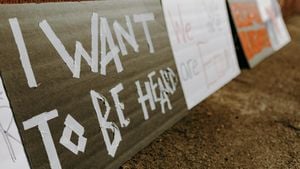The American dream has long been characterized by aspirations for home ownership, financial stability, and a brighter future, but recent developments indicate a shift in that narrative. A new report indicates that a significant number of renters in the United States no longer feel that traditional home ownership is a realistic or attainable goal. In an exclusive survey conducted by Harris Poll, which sampled numerous renters, a resounding majority expressed disillusionment with the prospect of owning a home.
These anxiety-riddled responses from renters reveal a stark reality: 61% of respondents fear they may never own a home, regardless of how hard they work. This sentiment is fueled by escalating property prices and the ongoing impact of inflation, which has made the dream of homeownership seem more like a distant daydream rather than an achievable goal. According to Libby Rodney, Chief Strategy Officer at Harris Poll, "When you think about Maslow’s hierarchy of needs, and housing is right at that foundational level of security, the implications on consumer psyche when things feel so unaffordable is something that will impact everyone."
The state of the housing market has undergone a remarkable transformation. In 2023, only 16% of home listings were affordable to the typical household, a significant decline from 50% just a decade ago. The aftermath of the pandemic further complicated the situation; interest rates soared, reflecting the Federal Reserve's attempt to curb inflation, taking the 30-year mortgage rate to a two-decade high of 7.79%. The result was a drastic decline in home sales, which fell to a 30-year low by the year's end.
Prior to COVID-19, the housing market had already been experiencing turbulence. Prices had inflated consistently, climbing each year since 2012, largely due to an insufficient supply of newly constructed homes. The pandemic merely exacerbated these existing trends, leading to a situation where inventory remains low and affordability is out of reach for most potential buyers.
Adding to the complexity, it is evident that homeownership is increasingly entwined with wealth accumulation. A concerning gap continues to widen between homeowners and renters, where homeowners now represent a mere 23.4% of bankruptcies as of January 2023, down from 54% in 2010. This shift indicates that a growing number of individuals are struggling financially despite aspirations for home ownership. For renters, this translates into a harsh reality: nearly half reported lacking funds to cover bills within the past month.
The disparities in homeownership are also markedly racial. By the end of 2023, the homeownership rate for white Americans was nearly 30% higher than for Black Americans, resulting in pronounced wealth gaps. For every $100 owned by white households, Black households held only $15, underscoring systemic inequalities deeply rooted in American society.
Moreover, the Harris Poll highlighted concerns far beyond financial hardships. Respondents manifested increasing anxiety over climate change's implications on home insurance costs, underscoring the growing awareness and fear surrounding climate-related disasters. Additionally, statistics indicate that hedge fund companies are gradually taking over more of the housing market, with 55% of renters anticipating that it will be a reality in the future.
While many renters express a desire for home ownership, a staggering 72% indicated that they would require financial assistance from family, whether through gifts or inheritances, to achieve this goal. Traditional avenues of securing a home are becoming less accessible, leaving many feeling trapped in a cycle of uncertainty.
The COVID-19 pandemic played a pivotal role in altering the landscape of wealth and homeownership expectations. Not only have job markets changed, but younger generations, particularly Gen Z and millennials, are also grappling with the dual pressures of high living costs and stagnant wages. As shared by John Gerzema, CEO of Harris Poll, an entire generation feels as if they are coming of age in a fractious and divisive world where traditional pathways to success do not apply.
A survey recently conducted showed that 65% of Gen Z members and 74% of millennials feel they are starting from a disadvantaged position compared to previous generations. This perception ties into broader cultural and economic shifts, as many young people opt for flexibility and job satisfaction over the former markers of stability that adorned their parents’ lives.
As a teacher from New York City, Matt Marino, age 27, articulated that achieving homeownership feels nearly impossible. He expressed that unlike older generations who focused on stable job opportunities leading to financial success, his age group prioritizes pursuing work that brings joy and fulfillment, reflecting a broader generational shift away from traditional expectations.
Similarly, Brandon Davila, a 26-year-old who graduated during the pandemic, has faced job market challenges that render stability elusive. He noted that the increasing competition and limited job opportunities have pushed many, including himself, to live with parents. The difficulties he faces emphasize a struggle against the generational narrative sold by previous generations, where simple summer jobs could lay the groundwork for long-term financial independence.
Despite such challenges, young Americans are increasingly favoring alternative definitions of success. For many, financial independence is no longer tied to home ownership but rather to flexibility, freedom, and job satisfaction. Chloe Duncan, an artist and illustrator, highlighted this shift by expressing her focus on developing sources of passive income to make up for fluctuations in her current line of work, revealing a pragmatic adaptation to current economic pressures.
As these trends continue to unfold, the American dream needs reevaluation. The goal of owning a home, once a core component of this dream, is increasingly seen as an unattainable fantasy for many; a status signifying prosperity rather than a fundamental security need. The emerging consensus suggests that innovative financial solutions, from rent-to-own schemes to alternative financing, will be necessary to revive aspirations once intrinsic to being American.
As the conversation unfolds around these economic realities, there is inconsistency in both the beliefs and behaviors of younger generations compared to those who came before them. The need for supportive systems and creative solutions to secure the respective futures amid an uncertain economy remains paramount. Addressing these concerns with nuanced understanding and proactive measures could lead to significant shifts in policy and perspective, ushering forth a new era in the evolving narrative of the American dream.



